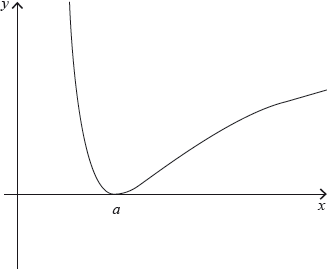| Date | May 2016 | Marks available | 7 | Reference code | 16M.1.hl.TZ1.13 |
| Level | HL only | Paper | 1 | Time zone | TZ1 |
| Command term | Find, Hence, and Prove that | Question number | 13 | Adapted from | N/A |
Question
The following diagram shows the graph of \(y = \frac{{{{(\ln x)}^2}}}{x},{\text{ }}x > 0\).

The region \(R\) is enclosed by the curve, the \(x\)-axis and the line \(x = e\).
Let \({I_n} = \int_1^{\text{e}} {\frac{{{{(\ln x)}^n}}}{{{x^2}}}{\text{d}}x,{\text{ }}n \in \mathbb{N}} \).
Given that the curve passes through the point \((a,{\text{ }}0)\), state the value of \(a\).
Use the substitution \(u = \ln x\) to find the area of the region \(R\).
(i) Find the value of \({I_0}\).
(ii) Prove that \({I_n} = \frac{1}{{\text{e}}} + n{I_{n - 1}},{\text{ }}n \in {\mathbb{Z}^ + }\).
(iii) Hence find the value of \({I_1}\).
Find the volume of the solid formed when the region \(R\) is rotated through \(2\pi \) about the \(x\)-axis.
Markscheme
\(a = 1\) A1
[1 mark]
\(\frac{{{\text{d}}u}}{{{\text{d}}x}} = \frac{1}{x}\) (A1)
\(\int {\frac{{{{(\ln x)}^2}}}{x}{\text{d}}x = \int {{u^2}{\text{d}}u} } \) M1A1
area \( = \left[ {\frac{1}{3}{u^3}} \right]_0^1\) or \(\left[ {\frac{1}{3}{{(\ln x)}^3}} \right]_1^{\text{e}}\) A1
\( = \frac{1}{3}\) A1
[5 marks]
(i) \({I_0} = \left[ { - \frac{1}{x}} \right]_1^{\text{e}}\) (A1)
\( = 1 - \frac{1}{{\text{e}}}\) A1
(ii) use of integration by parts M1
\({I_n} = \left[ { - \frac{1}{x}{{(\ln x)}^n}} \right]_1^{\text{e}} + \int_1^{\text{e}} {\frac{{n{{(\ln x)}^{n - 1}}}}{{{x^2}}}{\text{d}}x} \) A1A1
\( = - \frac{1}{{\text{e}}} + n{I_{n - 1}}\) AG
Note: If the substitution \(u = \ln x\) is used A1A1 can be awarded for \({I_n} = [ - {{\text{e}}^{ - u}}{u^n}]_0^1 + \int_0^1 n {{\text{e}}^{ - u}}{u^{n - 1}}{\text{d}}u\).
(iii) \({I_1} = - \frac{1}{{\text{e}}} + 1 \times {I_0}\) (M1)
\( = 1 - \frac{2}{{\text{e}}}\) A1
[7 marks]
(d) volume \( = \pi \int_1^{\text{e}} {\frac{{{{(\ln x)}^4}}}{{{x^2}}}{\text{d}}x{\text{ }}( = \pi {I_4})} \) (A1)
EITHER
\({I_4} = - \frac{1}{{\text{e}}} + 4{I_3}\) M1A1
\( = - \frac{1}{{\text{e}}} + 4\left( { - \frac{1}{{\text{e}}} + 3{I_2}} \right)\) M1
\( = - \frac{5}{{\text{e}}} + 12{I_2} = - \frac{5}{{\text{e}}} + 12\left( { - \frac{1}{{\text{e}}} + 2{I_1}} \right)\)
OR
using parts \(\int_1^{\text{e}} {\frac{{{{(\ln x)}^4}}}{{{x^2}}}{\text{d}}x = - \frac{1}{{\text{e}}} + 4\int_1^{\text{e}} {\frac{{{{(\ln x)}^3}}}{{{x^2}}}{\text{d}}x} } \) M1A1
\( = - \frac{1}{{\text{e}}} + 4\left( { - \frac{1}{{\text{e}}} + 3\int_1^{\text{e}} {\frac{{{{(\ln x)}^2}}}{{{x^2}}}{\text{d}}x} } \right)\) M1
THEN
\( = - \frac{{17}}{{\text{e}}} + 24\left( {1 - \frac{2}{{\text{e}}}} \right) = 24 - \frac{{65}}{{\text{e}}}\) A1
volume \( = \pi \left( {24 - \frac{{65}}{{\text{e}}}} \right)\)
[5 marks]
Examiners report
(a) and (b) were well done. Most candidates could integrate by substitution, though many did not change the limits during the substitution and, though they changed back to \(x\) at the end of their solution, under a different markscheme they might have lost marks for this in the intermediate stages.
(a) and (b) were well done. Most candidates could integrate by substitution, though many did not change the limits during the substitution and, though they changed back to \(x\) at the end of their solution, under a different markscheme they might have lost marks for this in the intermediate stages.
(c)(i) This part was well done by the candidates.
(c)(ii) This proved to be the part that was done by fewest candidates. Those who spotted that they should use integration by parts obtained the answer fairly easily.
(c)(iii) Many candidates displayed good exam technique in this question and obtained full marks without being able to do part (ii).
The same good exam technique was on show here as many students who failed to prove the expression in (c)(ii) were able to use it to obtain full marks in this question. A few candidates failed to remember correctly the formula for a volume of revolution.

